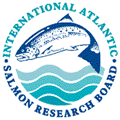SMOLTrack V
Studies of behaviour and survival of salmon during their migration – development of tagging programmes to follow the marine migration of salmon to oceanic feeding areas and back.

Recent marine survival estimates for Atlantic salmon are amongst the lowest recorded in decades and indicate that as little as 3 % of wild smolts now survive to return as adults. In recent decades, survival at sea has widely been accepted as the key determinant of river stock abundance. However, recent research conducted in Denmark, England, Ireland, Spain, Sweden and Northern Ireland through the EU funded SMOLTrack and related initiatives, have indicated that smolt mortality during the early outward migratory phase from ‘source to sea’ is much higher than previously assumed. Thus, early smolt mortality may be more important than marine mortality. To support this hypothesis, various studies have demonstrated that a reduction in negative pressures (e.g. predation, aquaculture) on smolts in the relevant zone of influence can ultimately boost associated numbers of adult returns. Therefore, it has become apparent that significant knowledge gaps remain to understand, quantify and partition the principal cumulative factors responsible for Atlantic salmon smolt survival during this critical life stage. In addition to the high mortality for smolts and post-smolts, there is also a significant mortality in the oceanic phase of Atlantic salmon. It is important to investigate if any part of this mortality may be managed. The SMOLTrack V project will build on the ongoing and published work of the previous SMOLTrack projects, enabling studies of behaviour and survival rates of salmon during their migration through the lower parts of rivers, estuaries and coastal areas. Thus, the project will provide data on smolt run timing and migration behaviour, as well as generate ocean migration data through nano-DST tagging of smolt. SMOLTrack V will further expand on the development of a ‘fit for purpose tagging programme’ to be able to follow the return migration of salmon from feeding areas in the Arctic Sea (East Greenland).
To address these issues, the following work packages (WP) will comprise the project:
- WP1 – Tagging in East Greenland
- WP2 – Full marine migration temperature of salmon smolts, gender dependant behaviour, smolt-runs in River Minho and test of impacts of handling, tagging.
- WP3 – Project Workshop
The following EU jurisdictions will participate in the project:
- Denmark
- Finland
- Ireland
- Portugal
- Sweden
- Spain
The following areas outside EU will participate in the project:
- England
- Northern Ireland
The existing SMOLTrack partnership, which has been operating since 2017, together with its new partners, has extensive experience in migratory fish research and particularly telemetry studies, often using their existing telemetry arrays. The distribution of experienced project partners, across the wide latitudinal distribution of salmon in Europe, will allow the project to investigate salmon under varying climatic ranges. It ensures a fast and wide international uptake of the results produced by the studies. Value for money (VFM) is assured through considerable partner agency in-kind staff time to undertake the project. SMOLTrack I, II, III and IV have already produced important research outputs (peer reviewed papers) and we aim to further advance understanding through SMOLTrack V.
More information on the SMOLTrack Projects can be found at https://www.smoltrack.eu/
